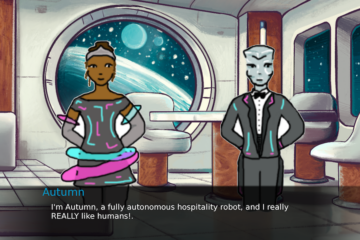Blog post topic suggested by Shelli Snyder
A fun way to make your science fiction future world feel aged-into is to include skills your characters have that they can’t use anymore.
Maureen McHugh once confessed to me that she was a wizard at hand-focusing microscopes. With an elegant twirl of the knob she could get a glass slide of a paramecium clear without going too close and cracking the glass. Other students at her university would ask her to do theirs. “It’s fascinating how we form these skills that become obsolete,” she said, offering it up as a writing prompt.
That conversation was back when I was very good at crimping category 5 ethernet cable, cutting the insulation back just so, very little waste, no exposed copper outside the head. I wired my whole house with Cat 5 outlets and… used two of the dozen outlets, for about a year. Then we got wifi.
What happens to training we don’t use anymore? I suppose it fades and goes away. I also know how to splice fiber optic with a razor blade, glass plate, and some epoxy. I know how to attach the stick-and-twist metal fiber optic cable ends that were used in dormitories at CWRU without looking, half bent over, hand behind and under the desk. I know how to punch down telephone blocks with the old single-ply copper wire. There’s a satisfying snap when the tool gets in there.
None of this is useful, unless I decide to write a story from the point of view of a network tech circa 1998.
As a computing professional, I’m familiar with the treadmill of learning and then not using information. Software standards change yearly. Someone brings me a problem with a system that was set up ten years ago and I feel like I’m visiting the Jurassic. (It is, of course, all the more rewarding when the problem is solved.)
I remember learning to fix cars from my old friend Mookie. He and I replaced the water pump on my then-boyfriend’s car. I would go on to replace four water pumps in my time, before cars just… got different. I remember Mookie saying, “It’s hard to get anyone to work on anything with fuel-injection. The engines are just so small and turned back. It’s hard to get at the parts.”
A few years later, I asked Mookie how car repair was going, and he said, “These days you have to plug it in to the diagnostic computer, and the biggest challenge is hacking that so it works without updates.” I wonder what this means for the backyard mechanics. Are they scrounging diagnostic computers second-hand? I wonder if you can get them at the junk yards. I remember “shopping” through a junk yard for a serpentine belt with Mookie. “Here, this car has the same engine…”
I’m about to slip into a side-topic on Right to Repair. We didn’t have to worry about being ABLE to fix things back then. When technology is open to repair, when it is established and known, you get to rig and jerry-rig. We used my set of hand-weights to stretch the belt when we couldn’t get it over its mounting wheels. I remember my Dad cutting a shape into the end of a long bar so he could use it as a big lever to release a stuck nut. I once fixed a friend’s laptop with a binder clip. I digress.
Technology moving forward means skills fading from utility. Each new step forward abandons an old step behind it. The “Kids today can’t read cursive!” effect.
Kids today do NOT know what a file system is, for example. They’ve come up on phones, using search and apps, they don’t even know what a folder path is!
Excuse me while I shake my cane.
What we got in exchange for losing the repairability of cars were engines that burn fuel more efficiently, or switch over to battery power seamlessly. Technology doesn’t just change, it advances, as humanity identifies needs. I would shudder to think how long our planet would last if all the billions of cars right now were burning six miles to the gallon like an old Caddy, no matter how easy to repair it was.
Technology also frees labor. I know how to hand-sew, but my sewing machine makes tedious repairs fast so I can fix two torn pillowcases and then get some writing done. Without it, the pillowcases would take all night. I don’t begrudge that there are people who don’t know how to hand-sew at all. They don’t have to. My dad made me learn to change the oil and change a tire before I was allowed to take Driver’s Education. These days, people don’t necessarily need to do that. There are ample and cheap oil change places, largely because of new tools that make mass oil changes super fast.
So, every time a skill turns obsolete, it’s a good thing. And if you want your science fiction world to feel aged-in, think about the steps passed over. If nothing else, it can be a cute throw-away line to show a character is a curmudgeon. “Back in my day, you had to know how to move in zero gravity!”


